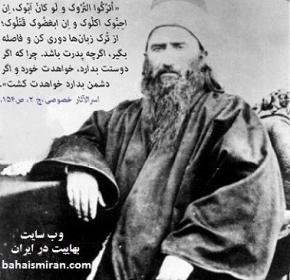“اُترُکُوا التُرُوک و لَو کانَ اَبُوک، اِن احِبُّوک اکلُوک و اِن ابغضُوک قَتَلُوک”
“Avoid Turks even if he is your father because if he loves you, he will eat you and if he considers you as enemy, he will kill you[1].”
One of the proselytizing methods of the Baha’ism cult is misusing the slogan of the oneness of humane world. In their proselytizing, the Baha’is are introducing the oneness of humane world as their advanced and the most important principle Hussein Ali Nouri says: “…all of you resemble to fruits belong to the same tree and are the leaves of the same branch. Be kind with the humane world and human kind. Interact with strangers like familiar people and pet aliens like companions…[2]”
However, the reality is that by reviewing the Baha’ism cult leaders’ works and speech, we will find out that their methods are against what they are trying to introduce because their behaviors and insults with some races and the followers of some religions are violating the slogan of the oneness of humane world.
The following notes are worthy to be mentioned:
1) Hussein Ali Nouri advices people to avoid the Turks. As if he hasn’t been aware of the fact that a person whose father is a Turk, he himself will be Turk too.
2) We can observe that some Turkish people are the members of the Baha’ism cult! Such people are the followers of a racist who are insulting their race.
Indeed, can such person who insults Turkish people be the herald of oneness of humane world?! Which divine prophet followed such a method?!
[1] Asadullah Fadhel Mazandarani, Asrarul Athar, Bija: The national institute of the faith press, 124 Badi’a, Vol. 2, p. 154.
[2] Abbas Effendi, Makatib, Egypt: Farajullah Zakiul Kurdi, 1921 A.D., 1st edition, Vol. 3, p. 160.
 English (UK)
English (UK)
 فارسی
فارسی 



